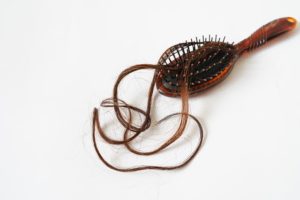The 2022 Academy Awards will go down in history as the year Will Smith both smacked Chris Rock onstage and won the award for best actor. The confrontation began when Chris made a joke about Will Smith’s wife, Jada Pinkett Smith, referring to her lack of hair. It’s likely that Chris thought that a shaved head was a Hollywood fashion choice, and therefore fair game for his comedic remarks. However, I’m guessing that it wasn’t until after the fact, and Will Smith’s emotional acceptance speech that Chris Rock and the rest of the world realized that Rock’s comic line had missed the mark and instead had tapped into something deeply painful. The truth is that Jada Pinkett Smith’s hair style is not a choice, but the result of a condition called alopecia. And as unfortunate as the incident was, it offers an educational opportunity on this condition.
Alopecia Areata
Alopecia is a general term for hair loss, but there can be a number of different manifestations and causes for your hair to fall out. One of the most common is alopecia areata, which is an autoimmune condition that affects your scalp. The job of your immune system is to recognize and destroy  foreign pathogens, such as viruses and bacteria. However, sometimes your immune system mistakes friend from foe and begins to attack healthy tissue, causing an autoimmune condition. Almost any part of your body can be the target of autoimmunity. For example, rheumatoid arthritis is an autoimmune condition of your joints. Alopecia areata is the result of your body’s immune attack of the hair follicles on your scalp, causing hair loss, usually in patches (areata describes the patchy nature of hair loss in this condition).
foreign pathogens, such as viruses and bacteria. However, sometimes your immune system mistakes friend from foe and begins to attack healthy tissue, causing an autoimmune condition. Almost any part of your body can be the target of autoimmunity. For example, rheumatoid arthritis is an autoimmune condition of your joints. Alopecia areata is the result of your body’s immune attack of the hair follicles on your scalp, causing hair loss, usually in patches (areata describes the patchy nature of hair loss in this condition).
While alopecia areata is the most common manifestation of this autoimmune condition, alopecia can show up in other ways:
- Alopecia totalis, in which all the follicles in your scalp are affected, causing total hair loss
- Alopecia universalis, in which hair loss affects your entire body
- Diffuse alopecia, which is sudden thinning of your hair
- Ophiasis alopecia, a term to describe hair loss in a band on the sides or back of your head
With alopecia areata and other autoimmune hair loss conditions, it is possible in some cases to regrow hair, as the follicles aren’t necessarily destroyed. Treatments for this kind of hair loss can include corticosteroids, either injected into the scalp, taken orally or applied topically. Rogaine, which is the brand name for a drug called minoxidil may be prescribed for topical use to help regrow lost hair.
Scarring Alopecia
Another kind of hair loss is called scarring alopecia. In this condition, inflammation completely destroys the hair follicles, causing permanent hair loss. Also known as cicatricial alopecia, scarring alopecia is actually a term for a group of conditions associated with scar tissue and permanent damage to the hair follicles.
loss. Also known as cicatricial alopecia, scarring alopecia is actually a term for a group of conditions associated with scar tissue and permanent damage to the hair follicles.
There are actually two types of scarring alopecia: primary, in which the follicles are affected by inflammation, causing scar tissue to develop; and secondary, in which the scarring and permanent damage is the result of some other condition, such as a burn, surgical scar or tumor. In both cases, the hair follicles have been damaged permanently and hair won’t regrow in those areas.
Other Causes of Hair Loss
In addition to scarring alopecia and alopecia areata, there are a number of other causes of hair loss. These include:
- If someone in your family has experienced thinning hair or hair loss, your risk is higher.
- Your age. As you grow older, your hair grows slower, the strands become thinner and you lose pigment.
- Stress, especially major life events and emotional upsets, either of which can cause sudden hair loss.
- Hormones, such as a thyroid imbalance or PCOS (polycystic ovarian syndrome).
- Pregnancy and childbirth, cause both by hormonal changes and physical stress.
- Vitamin and mineral deficiency. Hair growth depends on adequate nutrition. Low levels of iron, biotin, zinc and protein can cause hair thinning and loss.
- Cancer treatments, such as chemotherapy or radiation to your head.
- Some medications, such as oral contraceptives, calcium channel blockers, high levels of the blood thinner warfarin, some anti-depressant medications and even high levels of NSAIDs.
- Skin conditions that affect your scalp, including psoriasis and seborrheic dermatitis.
- Harsh chemicals, such as those used in perms, straighteners and some coloring agents. In addition, hair styles that pull on your scalp can cause hair loss.
Treatments for alopecia are based on the underlying cause of the hair loss. This may include balancing hormones, assessing your medications, dietary interventions, addressing stress and treating any other health conditions, such as anemia or psoriasis, that may associated with your hair loss.
Finally, it’s important to understand that hair loss can be traumatic. Even though it’s just…hair, it’s a component of your appearance and can affect your self-esteem. Hair loss can be emotionally painful. People show all kinds of charity when the cause of suffering is visible. However when you say something mean or even in jest, remember that you may be fanning the flames of an unknown source of pain or suffering. Violence on the part of Will Smith isn’t okay, but in that one moment at the Academy Awards, the suffering caused by alopecia became clear.



